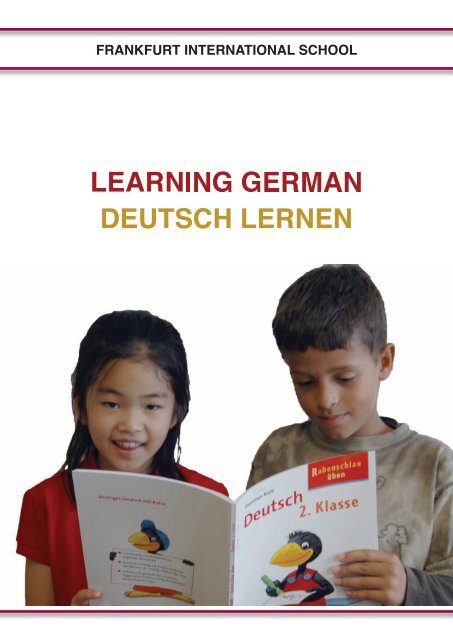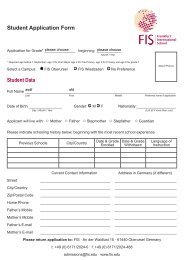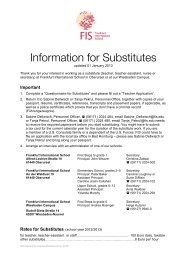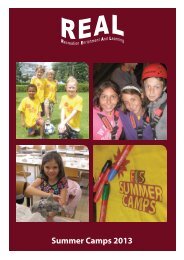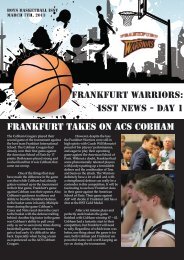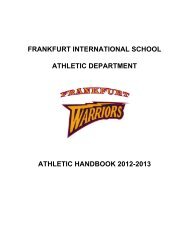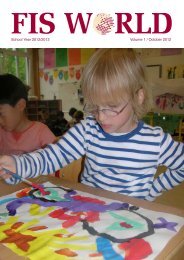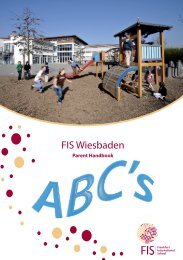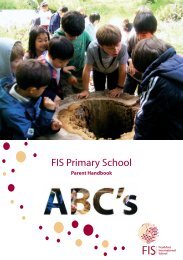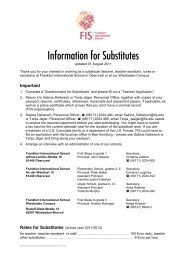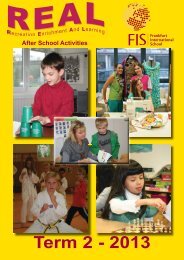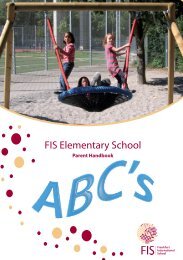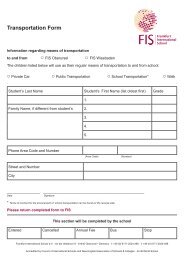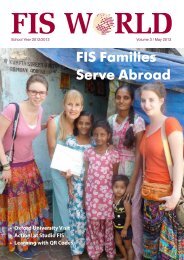Learning German Handbook. - Frankfurt International School
Learning German Handbook. - Frankfurt International School
Learning German Handbook. - Frankfurt International School
Create successful ePaper yourself
Turn your PDF publications into a flip-book with our unique Google optimized e-Paper software.
FRANKFURT INTERNATIONAL SCHOOL
FRANKFURT INTERNATIONAL SCHOOL<br />
<strong>Frankfurt</strong> <strong>International</strong> <strong>School</strong><br />
Our mission is to be the leading, culturally diverse and family-oriented international school with<br />
English as the principal language of instruction.<br />
We inspire individuals to develop their intellect, creativity and character to become independent,<br />
adaptable, socially responsible and internationally minded citizens, by ensuring a dynamic, inquiry-<br />
driven education of the highest standard.<br />
<strong>International</strong> <strong>School</strong> Wiesbaden
INDEX<br />
Introduction . . . . . . . . . . . . . . . . . . . . . . . . . . . . . . . . . . . . . . . . . . . . . . . . . . . . . . . 3<br />
Facts & Figures About Language <strong>Learning</strong> at FIS . . . . . . . . . . . . . . . . . . . . . . . . . . . 4<br />
Bilingual Education at FIS . . . . . . . . . . . . . . . . . . . . . . . . . . . . . . . . . . . . . . . . . . . . 5<br />
Language Pro ciency Teaching and Assessment. . . . . . . . . . . . . . . . . . . . . . . . . . . . . 6<br />
PS/ES <strong>German</strong> Course Sequences & Explanations . . . . . . . . . . . . . . . . . . . . . . . 6 - 7<br />
Elementary <strong>School</strong> Objectives . . . . . . . . . . . . . . . . . . . . . . . . . . . . . . . . . . . . . . 8 - 17<br />
Sample Continuums in the Primary and Elementary <strong>School</strong> . . . . . . . . . . . . . . 18 - 22<br />
Upper <strong>School</strong> Course Sequences . . . . . . . . . . . . . . . . . . . . . . . . . . . . . . . . . . . . . . . 23<br />
Upper <strong>School</strong> Objectives. . . . . . . . . . . . . . . . . . . . . . . . . . . . . . . . . . . . . . . . . 24 - 35<br />
Why Learn <strong>German</strong>?. . . . . . . . . . . . . . . . . . . . . . . . . . . . . . . . . . . . . . . . . . . . 36 - 38<br />
1
INTRODUCTION<br />
FIS is driven by its mission statement and beliefs. ese have produced a strategic plan which guides the school’s<br />
future expansion and provides direction for its academic courses. Language learning is an integral part of the<br />
strategic plan.<br />
From the FIS Strategic Plan 2005-2010<br />
Action Plan #4: We will ensure that students develop and increase pro ciency in English and additional<br />
languages, taking into account demographic changes.<br />
Speci c Result 4.5: Students will have a clearly articulated, cohesive <strong>German</strong> learning program which re ects<br />
best practices for each developmental level.<br />
e school’s policy manual contains four statements which deal directly with the importance of learning<br />
<strong>German</strong> at all levels.<br />
Extract from Policy 7.504<br />
3.<br />
As host country language, <strong>German</strong> is o ered at all levels throughout the school at a su cient number of<br />
pro ciency levels to meet the educational needs of all students.<br />
3.1<br />
In general, all students are expected to be enrolled in <strong>German</strong> language classes unless they have special educational<br />
needs, identi ed by quali ed faculty, which speci cally preclude such study.<br />
3.2<br />
Students who are <strong>German</strong> citizens and/or permanent legal residents of <strong>German</strong>y are generally required to attend<br />
<strong>German</strong> classes throughout the period of their enrollment at FIS. Such classes may be o ered within the regular<br />
<strong>German</strong> program or by means of dual language, immersion or bilingual classes.<br />
3.3<br />
Other students in grades 9-12 may choose an alternative language course once they have met what the school<br />
determines to be the minimum pro ciency requirements in <strong>German</strong> by means of an appropriate test. In some<br />
cases, permission may be granted to a student who enters grades 9-12 who does not met minimum pro ciency<br />
requirements in <strong>German</strong> to choose an alternative language course in order to ful ll the requirements of the<br />
<strong>International</strong> Baccalaureate program for the entry requirements of a particular institution of higher or further<br />
education.<br />
3
e school focuses on results. It is committed to the expansion of its language programs<br />
and it is proud of the achievement of its students.<br />
• As of the 2009/2010 school year, there are 12 languages being studied at FIS: English,<br />
<strong>German</strong>, French, Spanish, Japanese, Korean, Swedish, Dutch, Chinese, Norwegian,<br />
Farsi and Slovene.<br />
• 70% of our students are non-native English speakers. e vast majority are able to<br />
attend mainstream English classes after just two years of ESL instruction.<br />
• All students learn in an English immersion environment. All take English language<br />
arts courses and 99% are enrolled in <strong>German</strong> language arts.<br />
• 75% of elementary school students who began learning <strong>German</strong> in grade 2 or earlier<br />
are able to attend <strong>German</strong> classes at (near) native level by grade 8.<br />
• 40% of all FIS students speak three or more languages.<br />
• 70% of FIS students graduate with the <strong>International</strong> Baccalaureate Bilingual Diploma.<br />
• 95% of all students applying with the IB Bilingual Diploma to the Kultusministerium<br />
for Abitur equivalence were awarded a grade of 2 or higher.<br />
• Over the past years, our students have a 100% pass rate in IB mother tongue<br />
examinations.<br />
• FIS also o ers adult education classes in ESL, <strong>German</strong> and Italian as a foreign language<br />
and <strong>German</strong>, Spanish and French as part of the REAL (after-school) program.<br />
4<br />
FACTS AND FIGURES ABOUT LANGUAGE LEARNING
BILINGUAL EDUCATION AT FIS<br />
e bene ts of a bilingual education have been known for many years. Students perform just as well and often<br />
better than monolinguals on standardized tests; they are able to communicate with more people in more places;<br />
bilinguals exhibit greater nonverbal problem-solving abilities and more exible thinking; the bilingual learner’s<br />
brain is exercised more- both hemispheres are active when using more than one language; there are fewer<br />
memory lapses with older people and the risk of Alzheimer’s disease is lowered.<br />
At our Wiesbaden Campus, an integrated <strong>German</strong> program is part of the curriculum in grades one to three.<br />
Teachers present aspects of the Units of Inquiry of the PYP program in <strong>German</strong> and di erentiate their instruction<br />
according to the pro ciency level of the student in mixed <strong>German</strong> language ability homeroom classes. In grades<br />
four and ve, all children receive <strong>German</strong> language arts instruction three times a week and content-based<br />
instruction twice a week in leveled groups.<br />
In the primary school at FIS, there is an integrated program in which art is taught in <strong>German</strong> and English to<br />
children in primary through grade 1. Beginning in the 2009/2010 school year in the elementary school, the<br />
current “immersion” program will be phased out over a three-year period. It will be replaced by daily contentbased<br />
<strong>German</strong> language arts classes in leveled groups and by an optional “integrated <strong>German</strong>” program in<br />
grade three followed by an optional two-year English/<strong>German</strong> bilingual program in grades 4 and 5 where half<br />
the curriculum is presented in each language. Admission to the integrated and bilingual programs depends on<br />
the pro ciency level of the student’s English and <strong>German</strong>. In grades 6, 7 and 8, there is an optional integrated<br />
<strong>German</strong> program for suitable applicants where one complete academic course is taught in <strong>German</strong>. To date, this<br />
has been either humanities or science.<br />
At the end of grade 12, if a student has passed the IB diploma with <strong>German</strong> and English as Language A1 and<br />
A2 (as well as either a science or mathematics at higher level), s/he is awarded a bilingual diploma which is<br />
recognized by the <strong>German</strong> Kultusministerium as the equivalent of the Abitur.<br />
5
Pro ciency means what one can do with a language in the areas of speaking, listening, reading and writing.<br />
Students are regularly tested in these areas by means of standardized tests which indicate what their pro ciency<br />
levels are according to grids developed by the American Council on the Teaching of Foreign Languages (ACTFL)<br />
and by the Center for Applied Linguistics (CAL). Furthermore, students are also placed on a continuum for<br />
<strong>German</strong>, established by the teachers at FIS, which was modeled on the language learning continuums by the<br />
well-known researcher Bonnie Campbell Hill. A continuum indicates to teachers and parents the steps a learner<br />
has taken in improving his/her language learning and the steps still to be taken.<br />
What follows are the sequences and the desired pro ciency objectives of <strong>German</strong> courses at FIS.<br />
6<br />
LANGUAGE PROFICIENCY TEACHING AND ASSESSMENT<br />
PS/ES GERMAN COURSE SEQUENCES<br />
from entry point in each grade<br />
Primary <strong>School</strong><br />
Pre-Primary Primary Grade 1<br />
Heritage Learner <strong>German</strong> <strong>German</strong> Advanced/Fluent<br />
Foreign Learner <strong>German</strong> <strong>German</strong> Beginner/Intermediate<br />
Bilingual Learner <strong>German</strong> <strong>German</strong> Beginner/Intermediate<br />
Foreign Learner <strong>German</strong> <strong>German</strong> Beginner/Intermediate<br />
Elementary <strong>School</strong><br />
Grade 2 Grade 3 Grade 4 Grade 5<br />
Heritage Learner Fluent Fluent Fluent Fluent<br />
Foreign Learner Intermediate 1 Intermediate 2 Intermediate 3 Advanced/Fluent<br />
Bilingual Learner Intermediate 1/2 Intermediate 2/3 Intermediate 3/Adv. Advanced/Fluent<br />
Foreign Learner Intermediate 1 Intermediate 2 Intermediate 2 Intermediate 3<br />
Foreign Learner Beginner Intermediate 1 Intermediate 2 Intermediate 2/3<br />
Foreign Learner Beginner Intermediate 1 Intermediate 2<br />
Foreign Learner Beginner Intermediate 1<br />
Foreign Learner Beginner
PRE-PRIMARY, PRIMARY, GRADE 1 - BEGINNERS<br />
By the end of this course, the beginning learner will be able to:<br />
• Listening:<br />
o follow two-step directions and respond to familiar questions<br />
• Speaking:<br />
o respond to questions using <strong>German</strong> phrases; communicate with simple language patterns.<br />
PRE-PRIMARY, PRIMARY - ADVANCED/FLUENT<br />
By the end of this course, the advanced learner will be able to:<br />
• Listening:<br />
o understand detailed questions and follow multi-step directions<br />
• Speaking:<br />
o speak con dently and use vocabulary exibly; name with complex phrases (everyday language)<br />
GRADE 1 - ADVANCED/FLUENT<br />
By the end of this course, the learner will be able to:<br />
• Reading:<br />
o read topic related words with guidance; describe story line and make predictions<br />
• Writing:<br />
o write 1-2 sentences about a familiar topic using key vocabulary, familiar words and resources<br />
provided<br />
7
e learner will:<br />
• Oral communication:<br />
o understand simple questions and commands about familiar topics<br />
o show comprehension when read or spoken to<br />
o follow directions with familiar instructions<br />
o use a limited number of isolated words, simple phrases or memorized expressions<br />
o ask and answer simple questions<br />
• Reading:<br />
o read simple words with correct pronunciation<br />
o comprehend the meaning of simple written material<br />
o follow simple written instructions<br />
• Writing:<br />
o copy words and phrases with accuracy<br />
o begin to spell basic words correctly<br />
o write simple words and familiar phrases<br />
e learner will:<br />
• Oral communication:<br />
o understand familiar and some new sentence-level language with contextual support<br />
o use basic language in a limited number of everyday social and academic situations<br />
o begin to conjugate present tense of regular verbs<br />
• Reading:<br />
o read with correct pronunciation<br />
o demonstrate comprehension of written material<br />
• Writing:<br />
o write short, simple sentences about prepared topics<br />
o use present tense of regular verbs<br />
o spell basic vocabulary accurately<br />
8<br />
GRADE 2 GERMAN – BEGINNERS<br />
GRADE 2 GERMAN – INTERMEDIATE 1
e learner will:<br />
• Oral communication:<br />
o understand and respond to speech in familiar and new contexts, with some contextual<br />
support<br />
o use basic vocabulary to discuss personal and prepared academic topics<br />
o use sentence level speech<br />
o conjugate regular verbs in present tense<br />
• Reading:<br />
o read with correct pronunciation<br />
o demonstrate comprehension of written material<br />
• Writing:<br />
o write sentences about personal and prepared academic topics<br />
o use present tense forms of regular and irregular verbs<br />
o spell basic vocabulary accurately<br />
e learner will:<br />
GRADE 2 GERMAN – INTERMEDIATE 2<br />
GRADE 2 GERMAN – INTERMEDIATE 3<br />
• Oral communication:<br />
o understand and respond to connected speech about familiar and unfamiliar topics<br />
o use varied vocabulary to describe personal and academic topics<br />
o begin to use connected speech in everyday social and academic situations<br />
o conjugate regular verbs in present tense and attempt past tense<br />
• Reading:<br />
o read with correct pronunciation<br />
o demonstrate comprehension of easy readers with guidance<br />
• Writing:<br />
o write sentences about personal and prepared academic topics<br />
o conjugate regular and irregular verbs in present tense and attempt past tense<br />
o spell basic vocabulary accurately<br />
9
e learner will:<br />
• Oral communication:<br />
o comprehend main ideas and most details in connected speech on a variety of topics<br />
o communicate ideas and thoughts clearly and con dently<br />
o use age appropriate vocabulary when talking about general and academic topics<br />
o show good control of present and past tenses<br />
• Reading:<br />
o decode written material successfully using context, grammar and phonic cues<br />
o read early reader books with uency<br />
o learn and share information from reading<br />
o begin to interpret meaning with guidance<br />
• Writing:<br />
o write several sentences on a topic<br />
o use present and past tense correctly<br />
o begin to apply punctuation and capitalization rules<br />
o spell basic words correctly<br />
e learner will:<br />
• Oral communication:<br />
o understand simple questions and commands about familiar topics<br />
o show comprehension when read or spoken to<br />
o follow directions with familiar instructions<br />
o use a limited number of isolated words, simple phrases or memorized expressions<br />
• Reading:<br />
o read simple words with correct pronunciation<br />
o comprehend the meaning of simple written materials<br />
o follow written instructions<br />
• Writing:<br />
o copy words and phrases with accuracy<br />
o write simple words and familiar phrases<br />
o spell basic words correctly<br />
o begin to capitalize nouns<br />
10<br />
GRADE 2 GERMAN – ADVANCED/FLUENT<br />
GRADE 3 GERMAN – BEGINNERS
e learner will:<br />
• Oral communication:<br />
o understand familiar and some new sentence-level language with contextual support<br />
o use basic language in a limited number of everyday social and academic situations<br />
o begin to conjugate present tense of regular verbs<br />
• Reading:<br />
o write short simple sentence about prepared topics<br />
o demonstrate comprehension of written material<br />
o use reference materials<br />
• Writing:<br />
o write short simple sentences about prepared topics<br />
o use present tense of regular verbs<br />
o spell basic vocabulary accurately<br />
e learner will:<br />
GRADE 3 GERMAN – INTERMEDIATE 1<br />
GRADE 3 GERMAN – INTERMEDIATE 2<br />
• Oral communication:<br />
o understand and respond to speech in familiar and new contexts, with some contextual support<br />
o use basic vocabulary to discuss personal and prepared academic topics<br />
o use sentence level speech<br />
o conjugate regular verbs in present tense<br />
• Reading:<br />
o read with correct pronunciation<br />
o demonstrate comprehension of written material<br />
o use reference materials<br />
• Writing:<br />
o write sentences about personal and academic topics<br />
o use present tense of regular and some irregular verbs<br />
o spell basic vocabulary accurately<br />
11
e learner will:<br />
• Oral communication:<br />
o understand and respond to connected speech about familiar and unfamiliar topics<br />
o use varied vocabulary to describe personal and academic topics<br />
o begin to use connected speech in everyday social and academic situations<br />
o conjugate regular verbs in present tense and attempt past tense<br />
• Reading:<br />
o read with correct pronunciation<br />
o demonstrate comprehension of easy readers<br />
o use reference materials<br />
• Writing:<br />
o write connected sentences about personal and academic topics<br />
o conjugate regular and some irregular verbs in present tense and attempt past tense<br />
o begin to apply basic spelling rules<br />
e learner will:<br />
• Oral communication:<br />
o comprehend main ideas and most details in connected speech on a variety of topics<br />
o communicate ideas and thoughts clearly and con dently<br />
o use age appropriate vocabulary when talking about general and academic topics<br />
o show good control of present and past tenses<br />
• Reading:<br />
o decode written material successfully using context, grammar and phonic cues<br />
o read easy chapter books with uency<br />
o learn and share information from reading<br />
o interpret meaning (sequence, characters) with guidance<br />
• Writing:<br />
o write short ction, descriptions and poetry with guidance<br />
o use present and past tense correctly<br />
o edit for capitalization and punctuation<br />
o apply basic spelling rules<br />
12<br />
GRADE 3 GERMAN – INTERMEDIATE 3<br />
GRADE 3 GERMAN – ADVANCED/FLUENT
e learner will:<br />
• Oral communication:<br />
o understand simple questions and commands about familiar topics<br />
o show comprehension when read or spoken to<br />
o follow directions with familiar instructions<br />
o use a limited number of isolated words, simple phrases or memorized expressions<br />
o ask and answer simple questions<br />
• Reading:<br />
o read simple words with correct pronunciation<br />
o comprehend the meaning of simple written materials<br />
o follow written instructions<br />
• Writing:<br />
o copy words and phrases with accuracy<br />
o write simple words and familiar phrases<br />
o spell basic words correctly<br />
o capitalize nouns with guidance<br />
o begin to apply grammatical rules<br />
e learner will:<br />
GRADE 4 GERMAN – BEGINNERS<br />
GRADE 4 GERMAN – INTERMEDIATE 1<br />
• Oral communication:<br />
o understand familiar and some new sentence-level language with contextual support<br />
o use basic language in a limited number of everyday social and academic situations<br />
o begin to conjugate present tense of regular verbs<br />
• Reading:<br />
o read with correct pronunciation<br />
o demonstrate comprehension of written material<br />
o use reference materials<br />
• Writing:<br />
o write short simple sentences about prepared topics<br />
o use present tense of regular verbs<br />
o begin to use correct word order<br />
o spell basic vocabulary accurately<br />
13
e learner will:<br />
• Oral communication:<br />
o understand and respond to speech in familiar and new contexts, with some contextual support<br />
o use basic vocabulary to discuss personal and prepared academic topics<br />
o use sentence level speech<br />
o conjugate regular verbs in present tense<br />
• Reading:<br />
o read with correct pronunciation<br />
o demonstrate comprehension of written materials<br />
o use reference materials<br />
• Writing:<br />
o Write sentences about topics of personal interest and prepared academic topics<br />
o Use present tense of regular verbs and some irregular verbs<br />
o Use correct word order<br />
o Apply connectors<br />
e learner will:<br />
• Oral communication:<br />
o understand and respond to speech about familiar and unfamiliar topics<br />
o use varied vocabulary to describe personal and academic topics<br />
o begin to use connected speech in everyday social and academic situations<br />
o conjugate regular verbs in present tense and attempt past tense<br />
• Reading:<br />
o read with correct pronunciation<br />
o demonstrate comprehension of written materials<br />
o use reference materials<br />
• Writing:<br />
o write sentences about personal topics and academic topics<br />
o conjugate verbs in present tense and begin to use past tense<br />
o use correct word order and apply connectors<br />
o begin to apply spelling rules<br />
14<br />
GRADE 4 GERMAN – INTERMEDIATE 2<br />
GRADE 4 GERMAN – INTERMEDIATE 3
e learner will:<br />
• Oral communication:<br />
o comprehend main ideas and most details in connected speech on a variety of topics<br />
o communicate ideas and thoughts clearly and con dently<br />
o use age appropriate vocabulary when talking about general and academic topics<br />
o show good control of present and past tenses<br />
• Reading:<br />
o read medium level chapter books with uency<br />
o begin to expand knowledge of di erent genres<br />
o gather information from texts with guidance<br />
o discuss setting, plot, characters, and point of view with guidance<br />
• Writing:<br />
o write organized ction and non ction pieces with guidance<br />
o use present and past tenses correctly<br />
o revise for clarity and details with guidance<br />
o apply spelling rules<br />
e learner will:<br />
GRADE 4 GERMAN – ADVANCED/FLUENT<br />
GRADE 5 GERMAN – BEGINNERS<br />
• Oral communication:<br />
o understand simple questions and commands about familiar topics<br />
o show comprehension when read or spoken to<br />
o follow directions with familiar instructions<br />
o use a limited number of isolated words, simple phrases or memorized expressions<br />
o ask and answers simple questions<br />
• Reading:<br />
o read simple words with correct pronunciation<br />
o comprehend the meaning of simple written materials<br />
o follow written instructions<br />
• Writing:<br />
o copy words and phrases with accuracy<br />
o write simple words and familiar phrases<br />
o spell basic words correctly<br />
o capitalize nouns with guidance<br />
o begin to apply grammatical rules<br />
15
e learner will:<br />
• Oral communication:<br />
o understand familiar and some new sentence-level language with contextual support<br />
o use basic language in a limited number of everyday social and academic situations<br />
o begin to conjugate present tense of regular verbs<br />
• Reading:<br />
o read simple words with correct pronunciation<br />
o demonstrate comprehension of written material<br />
o use reference materials<br />
• Writing:<br />
o write short simple sentences on prepared topics<br />
o use present tense of regular verbs<br />
o begin to use correct word order<br />
o spell basic vocabulary accurately<br />
e learner will:<br />
• Oral communication:<br />
o understand and respond to speech in familiar and new contexts, with some contextual support<br />
o use basic vocabulary to discuss personal and prepared academic topics<br />
o use sentence level speech<br />
o conjugate regular verbs in present tense<br />
• Reading:<br />
o read with correct pronunciation<br />
o demonstrate comprehension of written material<br />
o use reference materials<br />
• Writing:<br />
o write sentences about personal and academic topics<br />
o use present tense of regular and some irregular verbs<br />
o use correct word order<br />
o apply connectors<br />
o begin to apply spelling rules<br />
16<br />
GRADE 5 GERMAN – INTERMEDIATE 1<br />
GRADE 5 GERMAN – INTERMEDIATE 2
e learner will:<br />
• Oral communication:<br />
o understand and respond to connected speech about familiar and unfamiliar topics<br />
o use varied vocabulary to discuss describe personal and academic topics<br />
o begin to use connected speech in everyday social and academic situations<br />
o conjugate regular verbs in present tense and attempt past tense<br />
• Reading:<br />
o read with correct pronunciation<br />
o demonstrate comprehension of easy readers<br />
o use reference materials<br />
• Writing:<br />
o write sentences about personal and academic topics independently<br />
o conjugate verbs in present tense and begin to use past tense<br />
o use correct word order and apply connectors<br />
o apply spelling rules<br />
e learner will:<br />
GRADE 5 GERMAN – INTERMEDIATE 3<br />
GRADE 5 GERMAN – ADVANCED/FLUENT<br />
• Oral communication:<br />
o Comprehend main ideas and most details in connected speech on a variety of topics<br />
o Communicate ideas and thoughts clearly and con dently<br />
o Use age appropriate vocabulary when talking about general and academic topics<br />
o Show good control of present and past tenses<br />
• Reading:<br />
o read challenging children’s literature with uency<br />
o expand knowledge of di erent genres<br />
o gather information from texts independently<br />
o begin to gain deeper meaning through interpretation with guidance<br />
• Writing:<br />
o begin to write organized ction and non ction pieces independently<br />
o use present and past tenses correctly<br />
o revise for clarity, details and word choice<br />
o apply correct spelling<br />
17
18<br />
ps/es deutsch reading continuum<br />
Expanding<br />
(Int. High)<br />
Beginning<br />
(Int. Mid)<br />
Developing<br />
(Int. Low)<br />
Emerging<br />
(Novice)<br />
Preconventional<br />
(Novice)<br />
• Reads easy chapter books.<br />
• Chooses, reads, and fi nishes a<br />
variety of materials at appropriate<br />
level with guidance.<br />
• Begins to read aloud with fl uency.<br />
• Reads silently for increasingly<br />
longer periods (15-30 minutes)<br />
• Discusses favorite reading material<br />
with others.<br />
• Uses reading strategies<br />
appropriately, depending on the<br />
text and purpose.<br />
• Uses word structure cues (e.g.,<br />
root words, prefi xes, suffi xes,<br />
word chunks) when encountering<br />
unknown words.<br />
• Increases vocabulary by using<br />
meaning cues (context).<br />
• Self-corrects for meaning.<br />
• Follows written directions.<br />
• Identifi es chapter titles and table of<br />
contents (text organizers).<br />
• Summarizes and retells story events<br />
in sequential order.<br />
• Responds to and makes personal<br />
connections with facts, characters,<br />
and situations in literature.<br />
• Compares and contrasts characters<br />
and story events.<br />
• Begins to interpret meaning with<br />
guidance.<br />
• Participates in guided literature<br />
discussions.<br />
• Identifi es own reading strategies<br />
and sets goals with guidance.<br />
• Reads early reader books.<br />
• Reads and follows simple written<br />
directions with guidance.<br />
• Identifi es basic genres (e.g., fi ction,<br />
nonfi ction, and poetry).<br />
• Uses basic punctuation when<br />
reading orally.<br />
• Reads independently (10-15<br />
minutes).<br />
• Chooses reading materials<br />
independently.<br />
• Learns and shares information from<br />
reading.<br />
• Uses meaning cues (context).<br />
• Uses sentence cues (grammar).<br />
• Uses letter/sound cues and patterns<br />
(phonics).<br />
• Recognizes word endings, common<br />
contractions, and many high<br />
frequency words.<br />
• Begins to self-correct.<br />
• Retells beginning, middle, and end<br />
with guidance.<br />
• Discusses characters and story<br />
events with guidance.<br />
• Identifi es own reading behaviors<br />
with guidance.<br />
• Reads books with simple patterns.<br />
• Begins to read own writing.<br />
• Begins to read independently for<br />
short periods (5-10 minutes).<br />
• Relies on illustrations and print.<br />
• Uses fi nger-print-voice matching.<br />
• Knows most letter sounds and letter<br />
clusters.<br />
• Recognizes simple words.<br />
• Uses growing awareness of sound<br />
segments (e.g., phonemes, syllables,<br />
rhymes) to read words.<br />
• Begins to make meaningful<br />
predictions.<br />
• Identifi es titles and authors in<br />
literature (text features).<br />
• Retells main event or idea in<br />
literature.<br />
• Sees self as reader.<br />
• Explains why literature is liked/<br />
disliked during class discussions<br />
with guidance.<br />
• Memorizes pattern books, poems,<br />
and familiar books.<br />
• Begins to read signs, labels, and<br />
logos (environmental print).<br />
• Demonstrates eagerness to read.<br />
• Pretends to read.<br />
• Uses illustrations to tell stories.<br />
• Reads top to bottom, left to right,<br />
and front to back with guidance.<br />
• Knows most letter names and some<br />
letter sounds.<br />
• Recognizes some names and words<br />
in context.<br />
• Makes meaningful predictions with<br />
guidance.<br />
• Rhymes and plays with words.<br />
• Participates in reading of familiar<br />
books and poems.<br />
• Connects books read aloud to own<br />
experiences with guidance.<br />
• Begins to choose reading materials<br />
(e.g., books, magazines, and charts)<br />
and has favorites.<br />
• Shows interest in reading signs,<br />
labels, and logos (environmental<br />
print).<br />
• Recognizes own name in print.<br />
• Holds book and turns pages<br />
correctly.<br />
• Shows beginning/end of book or<br />
story.<br />
• Knows some letter names.<br />
• Listens and responds to literature<br />
• Comments on illustrations in<br />
books.<br />
• Participates in group reading<br />
(books, rhymes, poems, and songs).
ps/es deutsch reading continuum (continued)<br />
Proficient (Norm)<br />
(Deutsch)<br />
Fluent<br />
(Deutsch)<br />
Bridging<br />
(Advanced)<br />
• Reads complex children’s literature.<br />
• Reads and understands informational<br />
texts (e.g., want ads, brochures,<br />
schedules, catalogs, manuals) with<br />
guidance.<br />
• Develops strategies and criteria<br />
for selecting reading materials<br />
independently.<br />
• Uses resources (e.g., encyclopedias,<br />
articles, Internet, and nonfiction texts)<br />
to locate information independently.<br />
• Gathers and analyzes information<br />
from graphs, charts, tables, and maps<br />
with guidance.<br />
• Integrates information from multiple<br />
nonfiction sources to deepen<br />
understanding of a topic with<br />
guidance.<br />
• Uses resources (e.g., dictionary and<br />
thesaurus) to increase vocabulary<br />
independently.<br />
• Identifies literary devices (e.g.,<br />
similes, metaphors, personification,<br />
and foreshadowing) with guidance.<br />
• Discusses literature with reference to<br />
theme, author’s purpose, and style<br />
(literary elements), and author’s craft.<br />
• Begins to generate in-depth responses<br />
in small group literature discussions.<br />
• Begins to generate in-depth written<br />
responses to literature.<br />
• Uses increasingly complex vocabulary<br />
in different subjects and in oral and<br />
written response to literature.<br />
• Uses reasons and examples to support<br />
ideas and conclusions<br />
• Probes for deeper meaning by<br />
reading between the lines” /through<br />
interpretation in response to literature.<br />
• Reads challenging children’s<br />
literature.<br />
• Selects, reads, and finishes a wide<br />
variety of genres with guidance.<br />
• Begins to develop strategies and<br />
criteria for selecting reading<br />
materials.<br />
• Reads aloud with fluency,<br />
expression, and confidence.<br />
• Reads silently for extended periods<br />
(30-40 min.).<br />
• Begins to use resources (e.g.,<br />
encyclopedias, articles, Internet,<br />
and nonfiction texts) to locate<br />
information.<br />
• Gathers information using the<br />
table of contents, captions,<br />
glossary, and index (text organizers)<br />
independently.<br />
• Begins to use resources (e.g.,<br />
dictionary and thesaurus) to<br />
increase vocabulary in different<br />
subject areas.<br />
• Begins to discuss literature with<br />
reference to setting, plot, characters,<br />
and theme (literary elements), and<br />
author’s craft.<br />
• Generates thoughtful oral and<br />
written responses in small group<br />
literature discussions with guidance.<br />
• Begins to use new vocabulary in<br />
different subjects and in oral and<br />
written response to literature.<br />
• Begins to gain deeper meaning<br />
through interpretation.<br />
• Begins to set goals and identifies<br />
strategies to improve reading.<br />
• Reads medium level chapter books.<br />
• Chooses reading materials at<br />
appropriate level.<br />
• Expands knowledge of different<br />
genres (e.g., realistic fiction,<br />
historical fiction, and fantasy).<br />
• Reads aloud with expression.<br />
• Uses resources (e.g., encyclopedias,<br />
CD-ROMs, and nonfiction texts)<br />
to locate and sort information with<br />
guidance.<br />
• Gathers information by using the<br />
table of contents, captions, glossary,<br />
and index (text organizers) with<br />
guidance.<br />
• Gathers and uses information from<br />
graphs, charts, tables, and maps<br />
with guidance.<br />
• Increases vocabulary by using context<br />
cues, other reading strategies, and<br />
resources (e.g., dictionary and<br />
thesaurus) with guidance.<br />
• Demonstrates understanding of the<br />
difference between fact and opinion<br />
with guidance.<br />
• Follows multi-step written<br />
directions independently.<br />
• Discusses setting, plot, characters,<br />
and point of view (literary<br />
elements) with guidance.<br />
• Responds to issues and ideas in<br />
literature as well as facts or story<br />
events.<br />
• Makes connections to other authors,<br />
books, and perspectives.<br />
• Participates in small group<br />
literature discussions with guidance.<br />
• Uses reasons and examples to support<br />
ideas and opinions with guidance.<br />
19
20<br />
ps/es deutsch writing continuum<br />
Expanding<br />
(Int. High)<br />
Beginning<br />
(Int. Mid)<br />
Developing<br />
(Int. Low)<br />
Emerging<br />
(Novice)<br />
Preconventional<br />
(Novice)<br />
• Writes short fi ction and poetry with<br />
guidance.<br />
• Writes a variety of short nonfi ction<br />
pieces (e.g., facts about a topic,<br />
letters, lists) with guidance.<br />
• Writes with a central idea.<br />
• Writes using complete sentences.<br />
• Organizes ideas in a logical<br />
sequence in fi ction and nonfi ction<br />
writing with guidance.<br />
• Begins to recognize interesting<br />
language.<br />
• Begins to use interesting language.<br />
• Uses several prewriting strategies<br />
(e.g., web, brainstorm) with<br />
guidance.<br />
• Listens to others’ writing and off ers<br />
feedback.<br />
• Begins to consider suggestions from<br />
others about own writing.<br />
• Adds description and detail with<br />
guidance.<br />
• Edits for capitals and punctuation<br />
with guidance.<br />
• Publishes own writing with<br />
guidance.<br />
• Writes legibly.<br />
• Spells most “Grundwortschatz”<br />
units and topic related vocabulary<br />
correctly and moves toward<br />
conventional spelling.<br />
• Identifi es own writing strategies<br />
and sets goals with guidance.<br />
• Writes several sentences about a<br />
topic.<br />
• Writes about observations and<br />
experiences.<br />
• Writes short nonfi ction pieces<br />
(simple facts about a topic) with<br />
guidance.<br />
• Chooses own writing topics.<br />
• Reads own writing and notices<br />
mistakes with guidance.<br />
• Revises by adding details with<br />
guidance.<br />
• Uses spacing between words<br />
consistently.<br />
• Forms most letters legibly.<br />
• Writes pieces that self and others<br />
can read.<br />
• Uses phonetic spelling to write<br />
independently.<br />
• Spells simple words,<br />
“Grundwortschatz” units and topic<br />
related vocabulary correctly.<br />
• Begins to use periods and capital<br />
letters, question marks and<br />
exclamation marks correctly.<br />
• Shares own writing with others.<br />
• Writes 1-2 sentences about a topic.<br />
• Writes names and familiar words.<br />
• Generates own ideas for writing.<br />
• Writes from top to bottom, left to<br />
right, and front to back.<br />
• Intermixes upper and lower case<br />
letters.<br />
• Experiments with capitals.<br />
• Experiments with punctuation.<br />
• Begins to use spacing between<br />
words.<br />
• Uses growing awareness of sound<br />
segments (e.g., phonemes, syllables,<br />
rhymes) to write words.<br />
• Spells words on the basis of sounds<br />
without regard for conventional<br />
spelling patterns.<br />
• Uses beginning, middle, and<br />
ending sounds to make words.<br />
• Begins to read own writing.<br />
• Uses pictures and print to convey<br />
meaning.<br />
• Writes words to describe or support<br />
pictures.<br />
• Copies signs, labels, names, and<br />
words (environmental print).<br />
• Demonstrates understanding of<br />
letter/sound relationship.<br />
• Prints with upper case letters.<br />
• Matches letters to sounds.<br />
• Uses beginning consonants to make<br />
words.<br />
• Uses beginning and ending<br />
consonants to make words.<br />
• Pretends to read own writing.<br />
• Sees self as writer.<br />
• Takes risks with writing.<br />
• Relies primarily on pictures to<br />
convey meaning.<br />
• Begins to label and add “words” to<br />
pictures.<br />
• Writes fi rst name.<br />
• Demonstrates awareness that print<br />
conveys meaning.<br />
• Makes marks other than drawing<br />
on paper (scribbles).<br />
• Writes random recognizable letters<br />
to represent words.<br />
• Tells about own pictures and<br />
writing.
ps/es deutsch writing continuum (continued)<br />
Proficient (Norm)<br />
(Deutsch)<br />
Fluent<br />
(Deutsch)<br />
Bridging<br />
(Advanced)<br />
• Writes persuasively about ideas,<br />
feelings, and opinions.<br />
• Creates plots with problems and<br />
solutions.<br />
• Begins to develop the main<br />
characters and describe detailed<br />
settings.<br />
• Begins to write organized and<br />
fluent nonfiction, including simple<br />
bibliographies.<br />
• Begins to use transitional sentences<br />
to connect “Absätze”.<br />
• Varies sentence structure, leads, and<br />
endings.<br />
• Begins to use descriptive language,<br />
details, and similes independently.<br />
• Uses voice to evoke emotional<br />
response from readers.<br />
• Begins to integrate information on a<br />
topic from a variety of sources.<br />
• Uses tools (e.g., dictionaries,<br />
word lists, spell checkers) to edit<br />
independently.<br />
• Selects and publishes writing in<br />
polished format independently.<br />
• Begins to set goals and identify<br />
strategies to improve writing in<br />
different genres.<br />
• Begins to write organized fiction<br />
and nonfiction (e.g., reports, letters,<br />
biographies, and autobiographies).<br />
• Develops stories with plots that<br />
include problems and solutions<br />
with guidance.<br />
• Creates characters in stories with<br />
guidance.<br />
• Writes poetry using carefully<br />
chosen language.<br />
• Begins to experiment with sentence<br />
length and complex sentence<br />
structure.<br />
• Varies leads and endings with<br />
guidance.<br />
• Uses description, details, and<br />
similes with guidance.<br />
• Uses dialogue with guidance.<br />
• Uses a range of strategies for<br />
planning writing.<br />
• Adapts writing for purpose and<br />
audience with guidance.<br />
• Revises for specific writing traits<br />
(e.g., ideas, organization, word<br />
choice, sentence fluency, voice, and<br />
conventions) with guidance.<br />
• Incorporates suggestions from<br />
others about own writing with<br />
guidance.<br />
• Edits for punctuation, spelling, and<br />
grammar with greater precision.<br />
• Uses tools (e.g., dictionaries, word<br />
lists, and spell checkers) to edit<br />
with guidance.<br />
• Develops criteria for effective<br />
writing in different genres with<br />
guidance<br />
• Writes about feelings and opinions.<br />
• Writes fiction with clear beginning,<br />
middle, and end.<br />
• Writes poetry using carefully<br />
chosen language with guidance.<br />
• Writes organized nonfiction pieces<br />
(e.g., reports, letters, and lists) with<br />
guidance.<br />
• Begins to use “Absätze” to organize<br />
ideas.<br />
• Uses interesting verbs, language,<br />
and dialogue with guidance.<br />
• Seeks feedback on writing.<br />
• Revises for clarity with guidance.<br />
• Revises to enhance ideas by adding<br />
description and detail.<br />
• Uses resources (e.g., thesaurus and<br />
word lists) to make writing more<br />
effective with guidance.<br />
• Edits for punctuation, spelling, and<br />
grammar.<br />
• Publishes writing in polished<br />
format with guidance.<br />
• Increases use of visual strategies,<br />
spelling rules, and knowledge of<br />
word parts to spell correctly.<br />
• Uses criteria for effective writing<br />
to set own writing goals with<br />
guidance.<br />
21
22<br />
german as an additionaL Language Listening & speaKing continuum<br />
new to german early acquisiton Becoming Familiar<br />
• Begins to listen attentively to a <strong>German</strong> speaker<br />
• Follows multi-step directions<br />
• Begins to use <strong>German</strong> in social situations<br />
• Responds to greetings with phrases<br />
• Responds to simple questions with more than one-word answers<br />
• Uses diff erent language functions in discussions (e.g. predicting<br />
and describing) with guidance<br />
• Participates in classroom discussions and off ers opinions and<br />
feedback with guidance<br />
• Begins to understand classroom and subject area language<br />
• Begins to use expanding vocabulary that is less context.-bound<br />
• Begins to speak <strong>German</strong> clearly<br />
• Communicates using short phrases and simple language patterns<br />
• Begins to use connected discourse (e.g. “Yesterday I go pool and<br />
I swam”)<br />
• Begins to follow illustrated stories and classroom instruction<br />
• Follows two-step directions<br />
• Responds to greetings with single words and/or phrases<br />
• Begins to respond to simple questions with one-work answers<br />
• Begins to express needs and give basic information (e.g. “I’m<br />
fi ne” and “this car”)<br />
• Participates orally in classroom discussions with guidance<br />
• Uses some basic classroom vocabulary<br />
• Understands everyday classroom and subject area language with<br />
guidance<br />
• Begins to repeat new <strong>German</strong> words and phrases clearly<br />
• Begins to communicate using short phrases and simple language<br />
patterns, producing telegraphic sentences (e.g. “I want to go<br />
shop buy toy”)<br />
• Practices <strong>German</strong> and tries new words and phrases<br />
• Listens attentively to a <strong>German</strong> speaker with guidance<br />
• Follows one-step directions<br />
• Uses context cues to responds appropriately to classroom<br />
routines<br />
• Responds to greetings with nods and gestures<br />
• Responds to simple questions with guidance<br />
• Expresses needs in <strong>German</strong> with single words and gestures<br />
• Responds during classroom discussions with nods and gestures<br />
• Participates non-verbally in the classroom<br />
• Names simple objects with guidance<br />
• Repeats <strong>German</strong> words and phrases with guidance<br />
• Echoes single words and/or shot phrases<br />
• Produces single words and/or stock phrases with guidance<br />
• Demonstrates enthusiasm about learning <strong>German</strong><br />
Becoming competent Becoming Fluent Fluent<br />
• Contributes to group discussion with ideas and appropriate<br />
suggestions<br />
• Paraphrases oral information independently<br />
• Communicates competently in social and academic settings<br />
• Participates and performs competently in all subject areas<br />
• Employs a full range of language functions independently, using<br />
abstract and complex language to express ideas and opinions<br />
appropriate to age<br />
• Speaks with confi dence in front of a group<br />
• Understands a wide range of classroom and subject area language<br />
with native competence<br />
• Uses vocabulary approximating that of a native speaker<br />
• Speaks as fl uently as a native speaker<br />
• Varies speech appropriately using intonation and stress<br />
independently<br />
• Uses a wide range of language patterns and complex compound<br />
tenses to create properly connected discourse (e.g. “Tomorrow I<br />
will be going on a long trip and I will see my good friend,.”)<br />
• Listens attentively to a <strong>German</strong> speaker<br />
• Listens to others and off ers opinions and/or feedback<br />
• Begins to paraphrase oral information<br />
• Uses language appropriately across the curriculum for diff erent<br />
purposes and audiences<br />
• Responds to complex questions independently<br />
• Asks questions to clarify content and meaning<br />
• Develops awareness that there are appropriate forms and styles of<br />
language for diff erent purposes and audiences<br />
• Begins to speak with confi dence in front of a group<br />
• Uses more extensive vocabulary, using abstract and specialized<br />
subject area words independently<br />
• Understands classroom and subject area language at nearly<br />
normal speed<br />
• Speaks <strong>German</strong> with near-native fl uency; any hesitation does not<br />
interfere with communication<br />
• Begins to vary speech appropriately using intonation/stress<br />
• Uses correct form when asking questions<br />
• Speaks confi dently and uses new vocabulary fl exibly<br />
• Begins to contribute to group discussions and off er opinions<br />
and/or feedback during discussions<br />
• Paraphrases oral information with guidance<br />
• Uses <strong>German</strong> in social situations<br />
• Begins to respond to more complex questions<br />
• Expresses needs and gives information independently<br />
• Begins to ask questions to clarify content and meaning<br />
• Begins to use more complex language functions (e.g.<br />
hypothesizing and reasoning) within an academic context<br />
• Begins to use an extensive vocabulary, using some abstract and<br />
specialized subject area words<br />
• Understands classroom and subject area language with<br />
repetition, rephrasing, or clarifi cation<br />
• Speaks <strong>German</strong> clearly<br />
• Produces longer, more complex utterances using phrases, clauses,<br />
and sequence words (e.g. “next” and “then”)<br />
• Begins to use correct form when asking questions<br />
• Begins to use correct verb tense to express present, past, and future<br />
• Shows interest in improving language skills and accuracy
upper schooL german course seQuences (from entry point in each grade)<br />
Grade 9 Grade 10 Grade 11 Grade 12<br />
Grade 6 Grade 7 Grade 8<br />
Deutsch 9 Deutsch 10 IBDP A1 Year 1 IBDP A1 Year 2<br />
Deutsch 6 Deutsch 7 Deutsch 8<br />
“ “ IBDP A2 Year 1 IBDP A2 Year 2<br />
“ “ “<br />
A2 Prep Year 1 A2 Prep Year 2 IBDP A2 Year 1 IBDP A2 Year 2<br />
Advanced 6 Advanced 7 Advanced 8<br />
A2 Prep Year 1 A2 Prep Year 2 IBDP A2 Year 1 IBDP A2 Year 2<br />
Intermediate 6 Advanced 7 Advanced 8<br />
A2 Prep Year 1 A2 Prep Year 2 IBDP A2 Year 1 IBDP A2 Year 2<br />
“ Intermediate 7 Advanced 8<br />
<strong>German</strong> 3 B Prep IBDP SL Lang B IBDP HL Lang B<br />
“ “ Intermediate 8<br />
<strong>German</strong> 2 <strong>German</strong> 3 B Prep IBDP SL Lang B<br />
“ “ “<br />
A2 Prep Year 1 A2 Prep Year 2 IBDP A2 Year 1 IBDP A2 Year 2<br />
Beginners 6 Intermediate 7 Advanced 8<br />
<strong>German</strong> 3 B Prep IBDP SL Lang B IBDP HL Lang B<br />
“ “ Intermediate 8<br />
<strong>German</strong> 2 <strong>German</strong> 3 B Prep IBDP SL Lang B<br />
“ “ “<br />
<strong>German</strong> 3 B Prep IBDP SL Lang B IBDP HL Lang B<br />
“ Beginners 7 “<br />
<strong>German</strong> 3 B Prep IBDP SL Lang B IBDP HL Lang B<br />
Beginners 7 Intermediate 8<br />
<strong>German</strong> 2 <strong>German</strong> 3 B Prep IBDP SL Lang B<br />
Beginners 8<br />
<strong>German</strong> 1 <strong>German</strong> 2 <strong>German</strong> 3 IBDP SL Lang B<br />
<strong>German</strong> 2<br />
IBDP Ab Initio Year 2<br />
<strong>German</strong> 1<br />
IBDP Ab Initio Year 1<br />
23
UPPER SCHOOL BEGINNERS GRADES 6-12<br />
After completion of <strong>German</strong> 1 – Beginners – a student should have reached<br />
the stage of Novice-Mid.<br />
Speaking<br />
Student is able to satisfy immediate needs using learned utterances. Demonstrates limited ability to create<br />
original sentences or cope with simple survival situations. Can ask questions or make memorized utterances<br />
or formulae. Vocabulary is limited to common areas in various everyday situations. Grammar shows only a<br />
few parts of speech. Verbs are generally in the present tense. Errors may be frequent and may severely inhibit<br />
communication. Speakers may have di culties expressing basic needs.<br />
Listening<br />
Student is able to understand short, learned utterances and some sentence-length phrases, particularly where<br />
context strongly supports understanding and speech is clearly audible. Comprehends words and phrases from<br />
simple questions, statements, high-frequency commands and courtesy formulae. May require repetition,<br />
rephrasing and/or a slowed rate of speech for comprehension.<br />
Reading<br />
Student has su cient control of the writing system to interpret written language in areas of practical need.<br />
Where vocabulary has been learned, can read for instructional and directional purposes standardized messages,<br />
phrases or expressions. At times, but not on a consistent basis, the reader may be able to derive meaning from<br />
material at a slightly higher level where context is supportive.<br />
Writing<br />
Student is able to write simple xed expressions and limited memorized material. Can supply basic information.<br />
Can write limited learned vocabulary for common objects, short phrases and simple lists. Writes in sentences<br />
or short phrases using very basic subject/verb/object word order. Can ask or answer very simple yes/no or<br />
information questions using limited memorized or very familiar sentence patterns, with frequent misspellings<br />
and inaccuracies. Has a concept of gender. Can sometimes create own sentences in the language but often uses<br />
memorized material or transformations of familiar patterns.<br />
24<br />
OBJECTIVES
PROFICIENCY GUIDELINES FOR GERMAN 2 - INTERMEDIATE<br />
After completion of <strong>German</strong> 2 – Intermediate – a student should have reached<br />
the stage of Intermediate-Mid.<br />
OBJECTIVES<br />
Speaking<br />
Student is able to handle successfully a variety of uncomplicated, basic and communicative tasks and social<br />
situations. Can ask and answer questions, initiate and respond to simple statements and maintain conversation,<br />
although in a highly restricted manner and with much linguistic inaccuracy. Within these limitations student<br />
can perform simple everyday tasks. Utterance length increases slightly compared to <strong>German</strong> 1. Vocabulary is<br />
adequate to express the most elementary needs. Pronunciation may continue to be in uenced by rst language.<br />
Misunderstandings frequently arise, but with repetition, can generally be understood by a sympathetic<br />
interlocutor.<br />
Listening<br />
Student is able to understand sentence-length utterances which consist of recombination of learned phrases<br />
on a variety of topics. Content continues to refer primarily to basic personal background and needs, social<br />
conventions and somewhat more complex tasks. Additional content areas include some personal interests and<br />
activities and a greater diversity of instructions and directions. Listening tasks not only pertain to spontaneous<br />
conversations but also to short routine conversations and some deliberate speech.<br />
Reading<br />
Student is able to get ideas and main information from basic texts featuring description and narration. He/she<br />
is able to read consistently with increased understanding of simple texts dealing with a variety of basic and social<br />
needs. Able to make suppositions about basic information to which the reader brings personal interest and/or<br />
personal knowledge. Student may have to read material several times for understanding.<br />
Writing<br />
Student is able meet a number of practical writing needs. Can write short and simple texts. Can create statements<br />
or questions within the scope of limited language experience. Material produced consists of recombination of<br />
learned vocabulary and structures into simple sentences on very familiar topics. Writing tends to be a loose<br />
collection of sentences or sentence fragments.<br />
25
UPPER SCHOOL PROFICIENCY GUIDELINES<br />
FOR GERMAN 3 – ADVANCED<br />
After completion of <strong>German</strong> 3 – Advanced – a student should have reached<br />
the stage of Advanced.<br />
Speaking<br />
Student is able to satisfy the requirements of everyday situations. He/she can handle complicated tasks and social<br />
situations with con dence. Can narrate and describe with some details, linking sentences together smoothly.<br />
Can communicate facts and talk casually about topics of current public and personal interest, using general<br />
vocabulary. e Advanced-level speaker can generally be understood without di culty.<br />
Listening<br />
Student is able to understand main ideas of connected discourse on a variety of topics. Comprehension may<br />
be uneven due to a variety of linguistic or extra-linguistic factors. Listener is aware of cohesive devices and<br />
may occasionally follow the sequence of thought in texts that frequently involve description and narration in<br />
di erent time frames or aspects.<br />
Reading<br />
Student is able to read paragraphs of certain length, particularly if presented with a clear underlying structure.<br />
Reader gets the main ideas and facts and misses some details. Comprehension derives not only from situational<br />
and subject matter knowledge but from increasing command of the language.<br />
Writing<br />
Student is able to write simple discourse of at least several paragraphs in length on familiar topics. Has su cient<br />
writing vocabulary to express self simply with some circumlocution. He/she may still make errors in punctuation,<br />
grammar and spelling. Uses a limited number of cohesive devices accurately. Writing may resemble literal<br />
translations from the native language, but a sense of organization is emerging.<br />
26<br />
OBJECTIVES
PROFICIENCY GUIDELINES FOR B PREP GERMAN<br />
(GRADE 10-12)<br />
OBJECTIVES<br />
After completion of IB prep <strong>German</strong>, a student should have reached the<br />
following level in the four language skills:<br />
Speaking<br />
Student is able to communicate clearly and e ectively in a range of situations. He/she should understand and<br />
use accurately oral forms of the language that are commonly encountered in a range of situations and select a<br />
register that is generally appropriate to the situation. Ideas are expressed with general clarity and some uency.<br />
Student can understand and respond appropriately to spoken material of average di culty.<br />
Listening<br />
Student is able to recognize the sounds of the language that are essential for e ective communication. Student<br />
can recognize and interpret correctly. He/she can understand grammatical structures that belong to natural,<br />
idiomatic speech. e student can understand language spoken at average pace within a su cient range of<br />
vocabulary.<br />
Reading<br />
Student is able to identify a range of types of text and register. Student can understand sentence structure and<br />
see how linguistic cohesion is maintained in a written text. Student can understand information that is explicitly<br />
stated and how ideas relate to each other. Student can extract key points of the text as well as textual details.<br />
Writing<br />
Student is able to understand and use accurately written forms of the language that are commonly encountered<br />
in a range of situations. Student can understand and respond appropriately to written material of average<br />
di culty. Student can write in a range of types of text (literacy, non-literary) and can use a range of vocabulary<br />
appropriately. Student can imply ideas through the choice of language and indicate personal attitude. Student<br />
can convey information clearly.<br />
27
PROFICIENCY GUIDELINES FOR DEUTSCH<br />
By the end of the school year students are expected to have reached the<br />
following profi ciencies:<br />
Speaking<br />
Student is able to speak uently in coherent sentences and to pronounce familiar words accurately. Uses<br />
di erentiated vocabulary and correct syntax. Articulates ideas and opinions clearly. Narrates events and<br />
experiences at appropriate speed. Can re-tell plots of stories read at home or in class. Can give short, connected<br />
speeches using notes and can recite memorized poetry.<br />
Listening<br />
Student is able to follow instructions. He/she can understand main ideas of all types of speech and texts. Can<br />
take down dictations given at appropriate speed and with logical/syntactical pauses.<br />
Reading<br />
Student is able to read at appropriate speed familiar and non-familiar texts. Can read and comprehend texts.<br />
Writing<br />
Student is able to spell familiar words correctly. Can spell most unfamiliar words phonetically correctly.<br />
Di erentiates between simple, compound and complex sentence structures. Uses tenses, cases, mode and voice<br />
properly. Can write narrative essays, reports, characterizations, plot summaries, descriptions and is able to<br />
describe events.<br />
28<br />
OBJECTIVES
INTERNATIONAL BACCALAUREATE GERMAN LANGUAGE A1<br />
GRADES 11-12 (native speakers)<br />
Higher Level<br />
OBJECTIVES<br />
Having followed the language A1 program at Higher Level (HL) candidates will be expected to demonstrate:<br />
• an ability to engage in independent literary criticism in a manner which reveals a personal response to<br />
literature<br />
• an ability to express ideas with clarity, coherence, conciseness, precision and uency in both written and oral<br />
communication<br />
• a command of the language appropriate for the study of literature and a discriminating appreciation of the<br />
need for an e ective choice of register and style in both written and oral communication<br />
• a sound approach to literature through consideration of the works studied<br />
• a thorough knowledge both of the individual works studied and of the relationships between groups of<br />
works studied<br />
• an appreciation of the similarities and di erences between literary works from di erent ages and/or cultures<br />
• an ability to engage in independent textual commentary on both familiar and unfamiliar pieces of writing<br />
• a wide-ranging appreciation of structure, technique and style as employed by authors, and of their e ects<br />
of the reader<br />
• an ability to structure ideas and arguments, both orally and in writing, in a logical, sustained and persuasive<br />
way, and to support them with precise and relevant examples<br />
29
INTERNATIONAL BACCALAUREATE GERMAN LANGUAGE A1<br />
GRADES 11-12 (native speakers)<br />
Standard Level<br />
Having followed the Language A1 program at Standard Level (SL) candidates will be expected to demonstrate:<br />
• an ability to approach works in an independent manner which reveals a personal response to literature<br />
• an ability to express ideas with clarity, coherence, conciseness, precision and uency in both written and oral<br />
communication<br />
• a command of the language appropriate for the study of literature and an appreciation of the need for an<br />
e ective choice of register and style in both written and oral communication<br />
• a sound approach to literature through consideration of the works studied<br />
• a thorough knowledge both of the individual works studied and of the relationships between groups of<br />
works studied<br />
• an appreciation of the similarities and di erences between literary works from di erent ages and/or cultures<br />
• an ability to comment on the language, content, structure, meaning and signi cance of both familiar and<br />
unfamiliar pieces of writing<br />
• an awareness of the e ects of structure, technique and style as employed by authors<br />
• an ability to structure ideas and arguments, both orally and in writing, in a sustained and logical way, and<br />
to support them with precise and relevant examples<br />
30<br />
OBJECTIVES
INTERNATIONAL BACCALAUREATE GERMAN LANGUAGE A2<br />
GRADES 11-12 (near-native speakers)<br />
Higher Level<br />
e bold text denotes the di erences between higher level and standard level.<br />
At the end of the language A2 course higher level candidates are expected to:<br />
• communicate clearly, uently and e ectively in a wide range of situations<br />
• understand and use accurately the oral and written forms of the language, in a range of styles and situations<br />
• understand and use an extensive range of vocabulary and idiom<br />
• select a register and style that are consistently appropriate to the situation<br />
• express ideas with a clarity and uency<br />
OBJECTIVES<br />
• structure arguments in a focused, coherent and persuasive way, and support them with relevant examples<br />
• assimilate and make use of complex written and spoken texts<br />
• engage in detailed, critical examination of a wide range of texts in di erent forms, styles and registers<br />
• appreciate the subtleties of technique and style employed by writers and speakers of the language<br />
• show sensitivity to the culture(s) related to the language studied<br />
31
INTERNATIONAL BACCALAUREATE GERMAN LANGUAGE A2<br />
GRADES 11-12 (near-native speakers)<br />
Standard Level<br />
e bold text denotes the di erences between higher level and standard level.<br />
• communicate clearly, uently and e ectively in a wide range of situations<br />
• understand and use accurately the oral and written forms of the language, in a range of styles and situations<br />
• understand and use a broad range of vocabulary and idiom<br />
• select a register and style that are generally appropriate to the situation<br />
• express ideas with clarity and uency<br />
• structure arguments in a focused and coherent way, and support them with relevant examples<br />
• understand and make use of moderately complex written and spoken texts<br />
• engage in critical examination of a wide range of texts in di erent forms, styles and registers<br />
• appreciate some subtleties of technique and style employed by writers and speakers of the language<br />
• show sensitivity to the culture(s) related to the language studied<br />
32<br />
OBJECTIVES
INTERNATIONAL BACCALAUREATE GERMAN LANGUAGE B<br />
GRADES 11-12 (foreign language)<br />
Higher Level<br />
e bold text denotes the di erences between higher level and standard level.<br />
At the end of the language B course higher level candidates are expected to demonstrate an ability to:<br />
• communicate clearly and e ectively in a wide range of situations<br />
• understand and use accurately oral and written forms of the language that are essential for e ective<br />
communication in a range of styles and situations<br />
• understand and use a wide range of vocabulary<br />
• select a register and style that are appropriate to the situation<br />
• express idea with general clarity and uency<br />
OBJECTIVES<br />
• structure arguments in a clear, coherent and convincing way<br />
• understand and analyse moderately complex written and spoken material<br />
• assess subtleties of the language in a wide range of forms, styles and registers<br />
• show an awareness of, and sensitivity to, the culture(s) related to the language studied<br />
33
INTERNATIONAL BACCALAUREATE GERMAN LANGUAGE B<br />
GRADES 11-12 (foreign language)<br />
Standard Level<br />
e bold text denotes the di erences between higher level and standard level.<br />
• communicate clearly and e ectively in range of situations<br />
• understand and use accurately oral and written forms of the language that are commonly encountered in<br />
a range of situations<br />
• understand and use a range of vocabulary in common usage<br />
• select a register that is generally appropriate to the situation<br />
• express ideas with general clarity and some uency<br />
• structure arguments in a generally clear, coherent and convincing way<br />
• understanding and respond appropriately to written and spoken material of average di culty<br />
• assess some subtleties of the language in a range of forms, styles and registers<br />
• show an awareness of, and sensitivity to, some elements of the culture(s) related to the language studied<br />
34<br />
OBJECTIVES
INTERNATIONAL BACCALAUREATE LANGUAGE AB INITIO<br />
GRADES 11-12 (Beginners)<br />
OBJECTIVES<br />
The overall objective of this course is for students to achieve communicative<br />
competence in a variety of everyday situations.<br />
At the end of the language ab initio course, candidates will be expected to demonstrate an ability to:<br />
• communicate information and some basic ideas clearly and e ectively, in a limited range of situations<br />
• understand and use accurately the essential spoken and written forms of the language in a limited range of<br />
situations<br />
• understand and use a limited range of vocabulary in common usage<br />
• use a register that is generally appropriate to the situation<br />
• show an awareness of some elements of the culture(s) related to the language studied<br />
35
Here are eight reasons for learning <strong>German</strong>:<br />
1. <strong>German</strong> is the most widely spoken foreign language in Europe.<br />
36<br />
More people speak <strong>German</strong> as their native language than any other language in Europe. It’s no wonder,<br />
since <strong>German</strong>y’s 83 million inhabitants make it the most populous European nation. But not only the<br />
residents of <strong>German</strong>y speak <strong>German</strong>. It is also an o cial language of Austria, Switzerland, Luxembourg, and<br />
Liechtenstein. It is the native language of a signi cant portion of the population in northern Italy, eastern<br />
Belgium, the Netherlands, Denmark, eastern France, parts of Poland, the Czech Republic, Russia, and<br />
Romania, as well as in other parts of Europe.<br />
While learning <strong>German</strong> can connect you to 120 million native speakers around the globe, remember that<br />
many people also learn <strong>German</strong> as a second language. It is the third most popular foreign language taught<br />
worldwide and the second most popular in Europe and Japan, after English.<br />
2. Knowing <strong>German</strong> creates business opportunities.<br />
<strong>German</strong>y has one of the strongest economies in the world. <strong>German</strong>y’s economic strength equals business<br />
opportunities. Multinational business opportunities exist throughout the European Union and in Eastern<br />
European countries, where <strong>German</strong> is the second most spoken language after Russian. Companies like<br />
BMW, Daimler, Siemens, Lufthansa, SAP, Bosch, In neon, BASF, and many others need international<br />
partners. e Japanese, who have the world’s second strongest economy, understand the business advantages<br />
that a knowledge of <strong>German</strong> will bring them: 68% of Japanese students study <strong>German</strong>.<br />
3. <strong>German</strong>s are innovators.<br />
WHY LEARN GERMAN?<br />
From Gutenberg’s printing press to Hertz’s discovery of electromagnetic waves, from Ehrlich’s development<br />
of chemotherapy to Einstein’s theory of relativity, to Brandenburg’s creation of the MP3 digital music<br />
format, throughout history <strong>German</strong>s have proven themselves time and again to be great innovators. at<br />
trend continues today. Four of the world’s 10 most innovative companies are located in <strong>German</strong>y and<br />
at 12.7% of the world’s patent applications, the country ranks 3rd in the world. Consequently, 200,000<br />
businesses introduce new products on the market each year.<br />
As a nation committed to research and development, <strong>German</strong>s are on the frontline of new technologies.<br />
<strong>German</strong>y exports more high-tech products than any other country except the U.S. and more than 600<br />
rms are active in the cutting-edge eld of biotechnology. 115 of these are located in Munich alone. e<br />
East <strong>German</strong> city of Dresden has become Europe’s microchip center with its more than 765 semiconductor<br />
rms.
Given the <strong>German</strong>s’ commitment to innovation, it is perhaps not surprising that two-thirds of the world’s<br />
leading international trade fairs take place in <strong>German</strong>y. ese include CeBIT, the world’s largest trade fair<br />
for information and communications technology, and the IFA consumer electronics trade fair.<br />
Such cultural mainstays as kindergarten, the Christmas tree, hot dogs and hamburgers were introduced by<br />
<strong>German</strong> immigrants to America. ey founded multiple breweries, created Levi’s jeans, invented ketchup,<br />
and created Hershey’s chocolate. <strong>German</strong>s had such a fundamental presence at the time of the founding of<br />
the United States that a <strong>German</strong> language version of the Declaration of Independence was printed only a<br />
few days after it was adopted.<br />
4. The <strong>German</strong> presence on the Internet supersedes most others.<br />
Considering what great innovators the <strong>German</strong>s are, it’s not at all surprising that they maintain a dominant<br />
Internet presence. With 8 million Internet domains, <strong>German</strong>y’s top-level country domain .de is second<br />
only to the extension .com. at makes <strong>German</strong> domain names even more popular than those with .net,<br />
.org, .info, and .biz extensions. Even the second-place country extension .uk trails far behind at 3.7 million<br />
domain names.<br />
5. One in ten books in the world is published in <strong>German</strong>.<br />
<strong>German</strong> is not only a language of the past. As proli c researchers and scholars, <strong>German</strong> speakers produce<br />
nearly 80,000 new book titles each year. e only language markets that produce more books annually are<br />
the Chinese and English publishing industries. In number of books published, Munich is second in the<br />
world only to New York. Since only a small percentage of <strong>German</strong> books are translated into other languages<br />
(for instance, approximately 10% into Korean and Chinese, just over 5% into English), only a knowledge<br />
of <strong>German</strong> will give you access to a vast majority of these titles.<br />
6. <strong>German</strong>-speaking countries have a rich cultural heritage.<br />
Apart from their many contributions to American culture, <strong>German</strong> speakers have a rich cultural heritage in<br />
their own right. <strong>German</strong>y is often referred to as the land of “Dichter und Denker” - of poets and thinkers. And<br />
rightly so, because <strong>German</strong> contributions to the arts and human thought have been nothing short of profound.<br />
Johann Wolfgang von Goethe, omas Mann, Franz Kafka, and Hermann Hesse are just a few authors<br />
whose names and works are well-known internationally. 10 Nobel prizes for literature have been awarded<br />
to <strong>German</strong>, Austrian, and Swiss <strong>German</strong> authors. e world of classical music is inseparable from the<br />
names of Mozart, Bach, Beethoven, Strauss, and Wagner to name only a few renowned <strong>German</strong>-speaking<br />
composers. Vienna remains an international center of music today. From the magni cent architecture of<br />
medieval buildings to the avant garde Bauhaus movement, from Dürer’s woodcuts to the expressionist<br />
masterpieces of Nolde, Kirchner, and Kokoschka, <strong>German</strong>s have made substantial contributions to world<br />
art and architecture.<br />
37
38<br />
Philosophy and the sciences would also be unthinkable without the contributions of <strong>German</strong> speakers.<br />
e philosophies of Kant, Hegel, Marx, Nietzsche, and numerous others have had lasting in uences on<br />
modern society. e psychologists Freud and Jung forever changed the way we think about human behavior.<br />
Scientists from the three major <strong>German</strong>-speaking countries have won dozens of Nobel prizes in physics,<br />
chemistry, and medicine.<br />
Knowing <strong>German</strong> allows you to access the works of these people in their original language and to fully<br />
understand the culture whence they derived. Anyone interested in these elds automatically expands her<br />
knowledge and skill by knowing <strong>German</strong>.<br />
7. <strong>German</strong> is required or recommended by many undergraduate and graduate<br />
programs.<br />
<strong>German</strong> speakers’ strong contributions in such a broad array of elds make the language an important asset<br />
in many disciplines. At the University of California, for instance, more majors recommend a knowledge<br />
of <strong>German</strong> as an important supplement than any other language (<strong>German</strong>: 56 majors, French: 43 majors,<br />
Spanish: 21 majors, Japanese: 7 majors). ese majors include a wide range of subjects -- from biology,<br />
physics, and chemistry to linguistics, religious studies, and art history.<br />
Considering the importance of the <strong>German</strong> language in the elds of publishing and research, it’s not<br />
surprising that many graduate schools want their graduates to have at least a reading knowledge of <strong>German</strong>.<br />
Knowing <strong>German</strong> gives graduates access to important research published in <strong>German</strong> books and professional<br />
journals.<br />
8. Hidden advantages<br />
If you are a foreign visitor, learning <strong>German</strong> will enable you to get more out of your stay in <strong>German</strong>y and<br />
more out of your travels in other <strong>German</strong>-speaking countries. You will make friends more easily and have<br />
greater insight into another culture.<br />
If you are a native <strong>German</strong> speaker, continuing to learn <strong>German</strong> will introduce you further to your cultural<br />
heritage. Furthermore, research has shown that keeping up the study of your mother tongue enables you to<br />
learn other languages more quickly and more e ciently!<br />
And Finally...<br />
for further information about language teaching and courses at FIS, please contact the language coordinator<br />
at 06171-2024-0.
<strong>Frankfurt</strong> <strong>International</strong> <strong>School</strong> e. V. • An der Waldlust 15 • 61440 Oberursel • <strong>German</strong>y • Tel: +49 (0) 6171-2024-0 • www. s.edu<br />
Desktop Publishing: BT Zimpel • Layout: Michele Weimar • Photos: BT Zimpel, Mathieu Corivaud<br />
Print: MediaPrint Taunusdruck GmbH • Berner Straße 111 • 60437 <strong>Frankfurt</strong> am Main<br />
September 2009<br />
At FIS we care about the environment. All our publications are printed on recycled paper using vegetal ink.<br />
39
BELIEFS<br />
FRANKFURT INTERNATIONAL SCHOOL<br />
We Believe at:<br />
• Honesty, integrity and respect are essential for building trusting relationships.<br />
• Each person is unique and has equal worth.<br />
• All people are responsible for their actions.<br />
• Open-mindedness, empathy and compassion are essential for living in a diverse<br />
community.<br />
• Developing head, heart and hand is necessary to realize one’s potential.<br />
• Leading a healthy and active lifestyle improves the quality of life.<br />
• Expectations that are challenging lead to higher levels of performance and<br />
improve results.<br />
• Commitment, enthusiasm and perseverance lead to success.<br />
• Education is a shared responsibility of students, family and school.<br />
• Contributing positively to society and the environment is our shared<br />
responsibility.<br />
• Our lives and the life of the community are enriched by diversity.<br />
• Nurturing curiosity and creativity stimulates exploration and discovery<br />
throughout life.
<strong>Frankfurt</strong> <strong>International</strong> <strong>School</strong><br />
An der Waldlust 15<br />
61440 Oberursel<br />
<strong>German</strong>y<br />
t: +49 (0) 6171-2024-0<br />
f: +49 (0) 6171-2024-384<br />
www. s.edu


